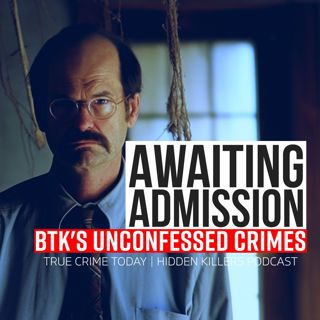
Dr. Katherine Ramsland Talks About the Connection Between Serial Killers and Suicide
Jaksokuvaus
Can the act of suicide among serial killers be seen as a final assertion of control or an ultimate act of remorse? This intriguing question forms the crux of a riveting conversation between Tony Brueski, host of the podcast "Hidden Killers," and renowned forensic psychologist Dr. Katherine Ramsland. In a thought-provoking exchange, Dr. Ramsland delves into the psychological complexities of serial killers who commit suicide. Contrary to popular belief, these individuals are not a monolith; they exhibit a wide array of personalities, disorders, and motivations, even in their reasons for ending their own lives. "A lot of people think all serial killers are alike, and they're not," Dr. Ramsland explains. She emphasizes the diversity among them, challenging the stereotype of a one-dimensional, remorseless killer. The motivations for suicide among these individuals are as varied as their crimes, ranging from a last-ditch effort to avoid capture to deep-seated remorse. Interestingly, only about 25% of these individuals leave behind notes, and even then, their motivations are rarely clear. Dr. Ramsland, also a suicideologist, underscores this point: "We're speculating, and here and there, we have some who made it very clear why they're doing this." The conversation takes a darker turn as they discuss serial killers who chose suicide at different stages - some before being identified, some during investigations, and others while imprisoned. Dr. Ramsland cites Leonard Lake, who committed suicide upon arrest, and Jack Unterweger, an Austrian serial killer who vowed never to spend another day in prison and followed through on this promise after his conviction. Brueski questions whether these acts are more about control than remorse. Dr. Ramsland's response is telling: "The ones who have expressed remorse are a really low percentage." This suggests that while some may experience genuine regret, many view suicide as a final exertion of control over their fates - a narcissistic suicide, as Dr. Ramsland labels it. The conversation also explores the correlation between the methods of suicide and the killers' circumstances, noting a prevalence of shootings and hangings. Dr. Ramsland points out the practical aspects of these choices, with availability often dictating the method. Further probing the depths of these killers' psyches, Brueski asks about the role of upbringing and mental health in their decisions to end their lives. Dr. Ramsland notes that many who committed suicide had backgrounds marked by psychiatric issues and sexual compulsion, adding complexity to their profiles. In a striking revelation, Dr. Ramsland debunks the myth that serial killers are devoid of empathy. They can, in fact, sense others' feelings; their issue lies in their indifference to these emotions, driven by their self-centered worldviews. The article concludes, leaving readers with a lingering question: When serial killers choose the path of suicide, are they seeking a final act of dominance over their narrative, or are they driven by a deeper, perhaps misunderstood, sense of remorse? This conversation with Dr. Katherine Ramsland sheds light on the intricate and often misunderstood psychological landscapes of serial killers, challenging our perceptions and inviting us to ponder the complex interplay of mind, crime, and ultimate self-destruction. Want to listen to ALL of our podcasts AD-FREE? Subscribe through APPLE PODCASTS, and try it for three days free: https://tinyurl.com/ycw626tj Follow Our Other Cases: https://www.truecrimetodaypod.com The latest on Catching the Long Island Serial Killer, Awaiting Admission: BTK’s Unconfessed Crimes, Delphi Murders: Inside the Crime, Chad & Lori Daybell, The Murder of Ana Walshe, Alex Murdaugh, Bryan Kohberger, Lucy Letby, Kouri Richins, Malevolent Mormon Mommys, Justice for Harmony Montgomery, The Murder of Stephen Smith, The Murder of Madeline Kingsbury, and much more! Listen at https://www.truecrimetodaypod.com